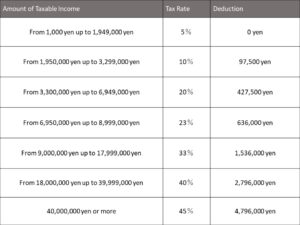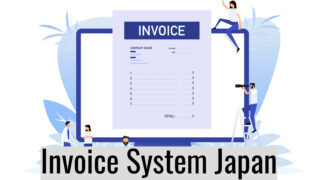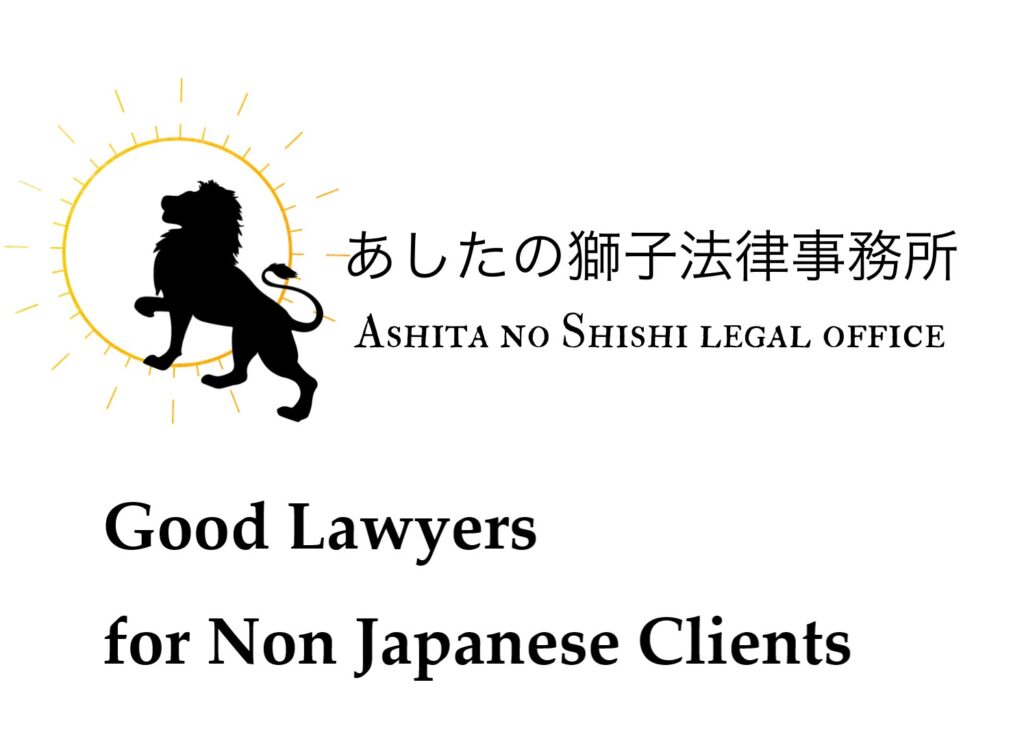If your business as self-employed is performing very well, it may be time to consider incorporation. But is it really a good idea to establish a company? Establishing and running a company take some costs. And, the administrations are not simple.
When you ask tax accountants for advice about when you should consider establishment of a company, they often advise you that it is when your business profit exceeds approximately 8 million yen. But, what is the reason for this explanation?
Taxes to be paid by Sole Proprietors
Income Tax
Japan’s income tax rates are based on a progressive tax system. And the income tax rate is set at a minimum of 5% and a maximum of 45%, depending on the amount of taxable income.

If the taxable income is 8,000,000 yen, the income tax will be calculated as follows.
8,000,000 yen x 0.23 – 636,000 yen = 1,204,000 yen
Note: For each year from 2013 to 2037, special income tax for recovery (in principle, 2.1% of the base income tax amount for that year) must be declared and paid together with income tax.
For details, please refer to the website of National Tax Agency.
Resident Tax
In addition to income tax, resident tax will also increase as the amount of taxable income as an individual increases.
Resident tax consist of two types of taxation.
One is “Taxation on per capita basis” which requires taxpayers to pay a fixed amount of tax regardless of their income;
Another one is “Taxation on per income” which requires taxpayer to pay 10% of taxable income.
One important point is the amount of resident tax is calculated based on the income of the previous year. So it can be heavy burden for people who earn a lot of money last year but failed to earn the same this year.
Tax Rate for Companies are lower.
On the other hand, the effective corporate tax rate for small and medium-sized corporations does not increase like income tax rate for individuals.
For companies, tax rate is
About 20% if taxable income is below 4 million yen,
About 25% if taxable income is between 4 million yen and 8 million yen,
About 34% if taxable income is over 8 million yen.
The higher your income as an individual will be, the higher the amount of income tax, inhabitant tax, and social insurance premiums will be.
Therefore, when the profit of your business as sole proprietor reaches certain level, it is better to establish a company and leave a certain amount of the profits to the company.
For details, please refer to the website of JETRO
Deeper Look into the Tax Saving Benefits of Incorporation
Keep executive remuneration at a certain level
If all profits earned as a company are paid to you as executive remuneration, you as individual will need to pay high rate income tax, inhabitant tax, and social insurance premiums based on such high amount of executive remuneration. So, if you do that, there are not much tax-saving benefits you can get through incorporation.
It is better to distribute the profits earned by the company to the company and the directors in an appropriate balance. The goal is to lower the total amount of taxes and social insurance premiums paid both by the company and the individuals.

There are some rules about how to decide executive remuneration. If such rules are not followed, the remuneration may not be recognized as deductible expense under corporate tax law. About this topic, please refer to our article “How to Decide Executive Remuneration.”

Corporations are more resilient to changes of the business environment.
Imagine this. You have been in business as a self-employed person for three years. The operating profit from your business has gradually increased each year to over 10 million yen. Next year, if all goes well, it may exceed 20 million yen. However, for some reason, the operating profit for the year after the next may drop to 5 million yen. Business is unstable, like this.
In such a case, if you are self-employed, you will be subject to income tax, inhabitant tax, and social insurance premiums based on the 20 million yen you earned as an individual. So, you will have to pay a lot of money (Note: there are certain deductions such as the blue return deduction, so the 20 million yen will not be taxed as is).
On the other hand, if you incorporate a company and make profit through the company, it is possible to reduce the amount of income tax, inhabitant tax, and social insurance premiums by limiting executive remuneration to 10 million yen, while retaining the remainder internally in the company.
Even if the next year’s operating profit is reduced to 5 million yen, your company can survive by using the previous year’s retained earnings.
A company has a wider range of allowable expenses than a sole proprietorship.
Profits left over in the company without being paid as executive remuneration will be subject to corporate tax. However, in the case of a company, the range of allowable expenses is wider than that of a sole proprietorship. It allows companies to save tax by reducing the profits.
And to learn about how to establish a company, please check our articles “Setting Up a Kabushiki Kaisha in Japan.”










